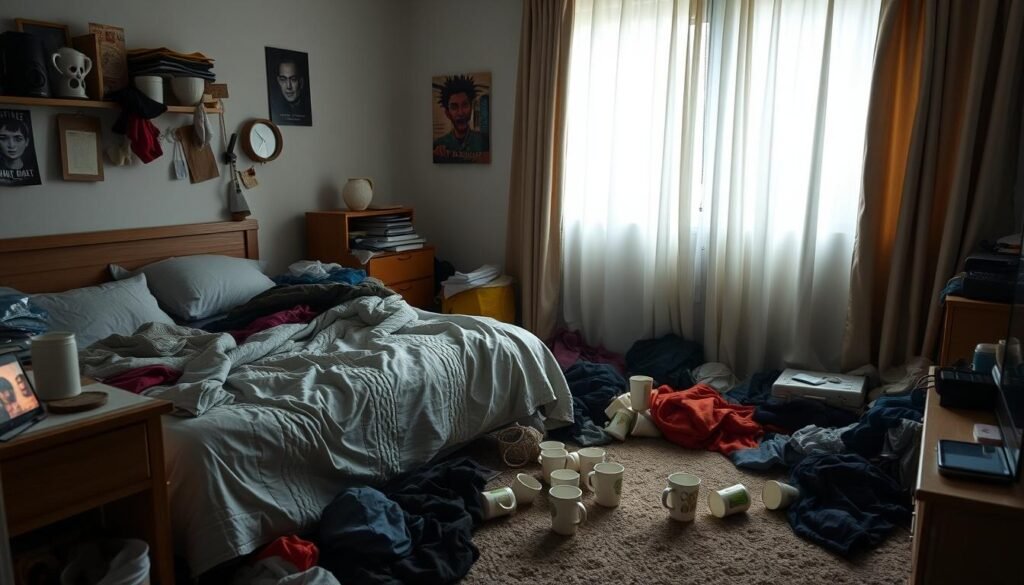About one in five Americans struggle with a major sleep disorder, such as insomnia or sleep apnea. This fact shows how crucial it is to know about sleep hygiene for better sleep quality. Sleep hygiene means the habits and surroundings that help you sleep well.
When people follow a good sleep routine, the benefits are huge. They can feel happier, think clearer, and have a better immune system. Key habits include keeping a regular sleep schedule, controlling light and noise, and doing relaxing activities before bed. For more tips, you can learn about sleep hygiene practices.
Key Takeaways
- Good sleep hygiene is essential for improving overall health and sleep quality.
- Regular sleep schedules can enhance daytime energy and mood.
- A comfortable sleep environment contributes to better rest.
- Limiting digital device use before bedtime can help regulate sleep hormones.
- Small lifestyle changes can lead to significant improvements in sleep quality.
- Up to 35% of adults in the U.S. report less than the recommended 7 hours of sleep.
Understanding Sleep Hygiene
Sleep hygiene is all about the habits that make for good sleep and overall health. It has become known that good sleep habits can make us healthier. Adopting these habits results in better sleep and improves our health.
Getting good sleep means having the right environment and regular bedtime routines. For example, the bedroom should be cool, between 60 to 67 degrees. This makes it a nice place to sleep. And, making sure the room is dark, quiet, and calm can help you sleep much better.
- Maintain a consistent sleep schedule, going to bed and waking up at the same times each day.
- Avoid large meals and stimulants such as caffeine and nicotine close to bedtime.
- Incorporate regular exercise into daily routines, while avoiding strenuous activity within four hours of sleep.
- Limit daytime napping; if necessary, keep it brief and before 3 PM.
Listening to your body is key in Sleep Hygiene. Notice when you’re getting sleepy, as that’s the best time to go to bed. A nice way to get ready for bed is by taking a warm bath. This helps lower your body temperature, making it easier to fall asleep.
Being mindful of sleep hygiene is important. Good practices help us avoid sleep problems in the future. If you still have trouble sleeping even after trying these tips, it might be time to see a doctor. They can check for sleep disorders and suggest treatments. Knowing about sleep hygiene is the first step toward better sleep.
The Importance of Sleep Hygiene
Sleep hygiene is key to our well-being. Many studies show sleep hygiene is crucial not just for rest. It affects our health, especially mental health and sleep disorders risk.
Impact on Mental Health
A study in Tabuk City with 384 adults showed interesting results. 75.8% with poor sleep hygiene had depression signs. Only 59.6% with good habits showed these signs.
Lack of sleep can cause emotional issues. This shows how important sleep hygiene is for our emotions.
Influence on Physical Health
Bad sleep affects more than our mood. It can lead to diabetes, heart disease, and high blood pressure. In the mentioned study, 22.5% with poor sleep felt very sleepy during the day. This was only true for 11.7% of those with good sleep habits.
These stats highlight the role of sleep hygiene in our physical well-being.
Connection to Sleep Disorders
Ignoring sleep guidelines can cause sleep disorders like insomnia. This was seen among individuals with poor sleep habits. Such disorders make it hard to get good sleep. Keeping a sleep diary helps identify what’s wrong, helping talk to doctors about it.
| Sleep Hygiene Practices | Depression Rates | Daytime Sleepiness Rates |
|---|---|---|
| Poor (Median Score 25.0) | 75.8% | 22.5% |
| Good | 59.6% | 11.7% |
Factors Affecting Sleep Quality
Knowing what affects sleep quality is key for a good Healthy Sleep Routine. The sleep setting, our lifestyle choices, and mental health all play a big part. For example, the amount of light, noise, and the room’s temperature can either mess with or help our sleep.
Lifestyle choices are also important to look at. Drinking a lot of caffeine in the afternoon can cause Sleep Deprivation and make falling asleep hard. While working out is good, doing it too close to bedtime is not. Having a relaxing routine before bed helps improve Sleep Quality.
Stress and anxiety can also make sleeping hard. These feelings can lead to tossing and turning, making getting the recommended seven hours of sleep tough for adults. Research shows that not sleeping well can make mental health worse, creating a bad cycle. Tracking sleep with things like sleep diaries can help understand and fix these sleep problems.
If it takes more than thirty minutes to fall asleep, this might show a bigger issue. Making sure your sleep area is quiet and dark is important for good rest. Cutting down on screen time before bed can really help sleep better.
Getting to know these factors not only improves health but also keeps you emotionally balanced. For better sleep, the first step is acknowledging these influences on restorative sleep.
Healthy Sleep Routine: Establishing Good Habits
Creating a Healthy Sleep Routine means forming habits that improve sleep quality. It’s vital to keep a consistent sleep schedule. Doing so helps set our internal clock and boosts well-being.
Consistent Sleep Schedule
Keeping a regular sleep schedule is a big step towards restful nights. Try to wake up and sleep at the same time every day, aiming for seven to eight hours of sleep. This rhythm improves sleep quality and fights off bad effects, like heart disease and depression. Healthy sleep habits are key to mental clarity and emotional stability.
Pre-Sleep Activities
Doing calm activities before bed helps us wind down. Lowering lights, reading, or meditating tells our body it’s time to rest. Avoid electronics an hour before sleep to boost sleep quality. Cutting down on blue light from screens aids sleep hygiene. A peaceful bedtime routine makes for better nights.
Daytime Habits That Influence Sleep
What we do during the day affects our sleep at night. Staying active and getting sunlight help our sleep cycle. Keep naps under an hour so they don’t mess up night sleep. Watching our diet by avoiding big meals, caffeine, and alcohol before bed aids in restful sleep. Handling stress well is part of a Healthy Sleep Routine, keeping us healthy overall.

Optimizing Your Sleep Environment
Creating a great place to sleep is key to sleeping well. It’s important to have comfy bedding, right light and sound levels, and keep it cool. Together, these factors make it easier to relax and sleep deeply.
Comfortable Bedding
What you sleep on matters a lot for good sleep. A good mattress and pillows are worth investing in. They should support your body correctly and last a long time. Also, sheets and pillowcases should feel soft and let air through to keep you comfy all night.
Managing Light and Noise
Keeping your bedroom dark and quiet is a must for sleeping well. Use blackout curtains to block light and find ways to keep noise down, like using a white noise machine or earplugs. Too much artificial light at night can mess with your sleep. So, a dark, quiet room is best for a good night’s sleep.
Temperature Control
Keeping your bedroom at the right temperature helps you sleep better. The best temperature is between 65 and 68 degrees Fahrenheit. This helps your body stay at a good sleeping temperature. You might also change your bedding or what you wear to bed to stay comfortable all night.
Identifying Signs of Poor Sleep Hygiene
It’s key to spot the Signs of Poor Sleep Hygiene to boost Sleep Quality. Wanting more than half an hour to drift off often signals sleep issues. Also, waking up a lot during the night can mess with your sleep cycle. This leads to feeling tired the next day.
If you’re not sleeping for 85% of the time you’re in bed, it’s a red flag. Feeling sleepy during the day and having trouble focusing are signs too. Conditions like asthma and acid reflux can lower sleep quality, showing the importance of good sleep habits.
Smoking and having caffeine daily can harm your Sleep Quality. Alcohol and using screens right before bed also disrupt sleep. This can make a cycle of not sleeping well, which affects your energy and health.
| Signs of Poor Sleep Hygiene | Potential Consequences |
|---|---|
| Takes more than 30 minutes to fall asleep | Increased daytime fatigue |
| Wakes up more than once per night | Difficulty concentrating |
| Spends less than 85% of time in bed asleep | Chronic health issues |
| Daytime fatigue | Impaired physical performance |
| Inadequate sleep hygiene practices | Increased risk of sleep disorders |
Spotting these signs is crucial for improving Sleep Quality. Recognizing and tackling these issues can lead to better sleep habits and health.

Strategies to Improve Sleep Hygiene
Improving your sleep hygiene needs a careful look at your daily habits. With the right strategies, you can enjoy better sleep and feel more relaxed. Here are tips to help you sleep better.
Building a Bedtime Routine
Creating a calming bedtime routine helps you fall asleep easier. Try reading, stretching, or practicing mindfulness before bed. This tells your body it’s time to rest. Being consistent with a Bedtime Routine helps you fall and stay asleep all night.
Diet and Sleep Hygiene
What you eat can affect how well you sleep. It’s best to avoid big meals, caffeine, and alcohol before bedtime. These changes improve your sleep hygiene and reduce morning anxiety and stomach problems. For more info on diet and mental health, check out this connection to mental health and diet.
Limitations on Electronic Use
Cutting down on electronics before bed can make a big difference. The blue light from screens can mess with your sleep hormone levels. Avoiding electronics an hour before bed helps you sleep better, giving you a more restful night.
Understanding Sleep Disorders
Millions are affected by sleep disorders, harming their health and well-being. Insomnia, for example, affects about one-third of adults. It can be short-term or long-term, with 4-22% of people meeting the criteria for insomnia disorder. This condition makes it hard to fall or stay asleep, hurting sleep quality and leading to sleep deprivation.
Sleep apnea impacts around 25 million adults in the U.S. It causes breathing to stop and start during sleep, leading to frequent awakenings. This lowers sleep quality and increases the risk of heart disease by 48% in those with chronic sleep lack.
Restless Legs Syndrome (RLS) and narcolepsy are other known sleep disorders. RLS is found in 5% to 15% of adults, and narcolepsy affects 1 in 2,000, causing sudden sleep during the day. Many people with insomnia also have mental health problems like anxiety and depression, affecting 40 to 50%.
Many Americans, about 34%, rate their sleep quality as poor. Sleep disorders are also tied to obesity, with 55% of sufferers being obese. The link between sleep deprivation and mental issues shows the need for professional help. Luckily, treatments help about 80% of those who seek them.
| Sleep Disorder | Prevalence | Impact on Health |
|---|---|---|
| Insomnia | 30% at some point in life | Increased risk of anxiety and depression by 20% |
| Sleep Apnea | Affects 25 million adults | Heightened risk of cardiovascular disease |
| Restless Legs Syndrome | 5% to 15% of adults | Disrupts sleep quality |
| Narcolepsy | 1 in 2,000 people | Daytime sleepiness and accidents |
Finding out if you have a sleep disorder is key to better life quality. It’s wise to talk to health experts for advice and to improve sleep patterns. For tips on good sleep habits, check out this resource.

The Effects of Sleep Deprivation on Health
Sleep deprivation impacts our mental and physical health deeply. In the U.S., nearly half the population battles with sleep problems. About one-third of adults don’t get the recommended seven hours of sleep. This can lead to serious health issues like obesity, diabetes, and heart disease.
Sleep loss affects our mental well-being, causing anxiety, irritability, and sometimes depression. It makes concentrating hard, reduces our alertness, and increases mistakes. In the long run, it could even harm our decision-making skills and creativity.
Not getting enough sleep weakens our immune system, too. This makes us more likely to catch colds and reduces vaccine effectiveness. It also messes with hormones, making it harder to control our weight.
Sleep deprivation doesn’t just harm health; it affects diabetes and heart disease by messing with insulin and heart health. It can cause serious issues with our nervous system over time. Additionally, driving while tired leads to many injuries and deaths in the U.S. every year.
Conclusion
It’s key to know how vital sleep hygiene is for our health and good sleep. A whopping 56% of Americans struggle with sleep issues. This shows that focusing on a healthy sleep pattern really changes our daily lives. Good sleep hygiene helps our bodies, our emotions, and how we think.
By making simple changes like a steady bedtime routine and a cozy sleep area, we can sleep better. Keeping your sleeping area clean, avoiding caffeine and heavy meals before bed, and getting sunlight during the day are crucial. These steps show how important sleep hygiene is in our lives. For those who want to learn more, why sleep is essential offers more information on getting deep sleep.
Studies keep showing how sleep affects our health. So, it’s very important to follow good sleep hygiene tips. Knowing when your sleep hygiene is bad and improving your sleep habits not only makes you healthier. It also makes you feel more energetic and lively.